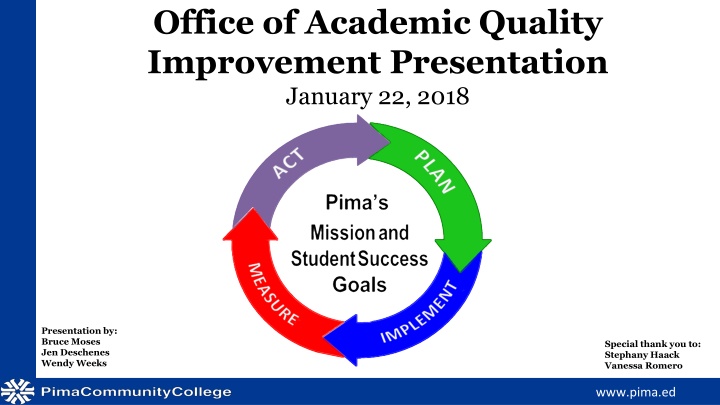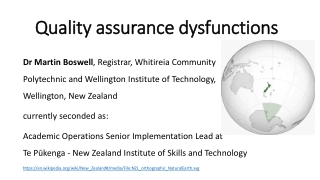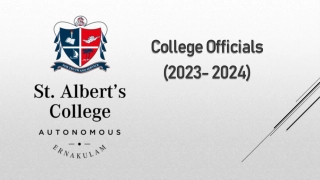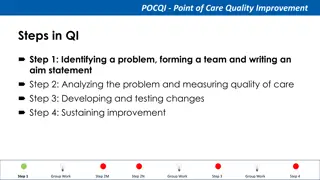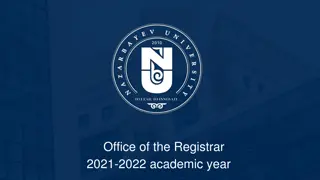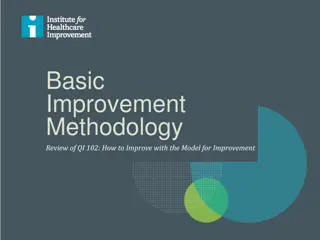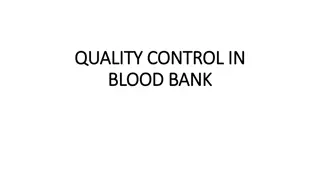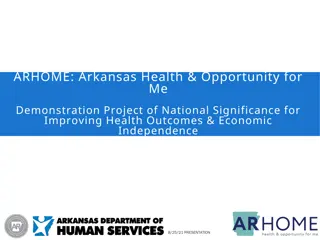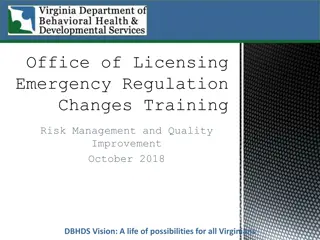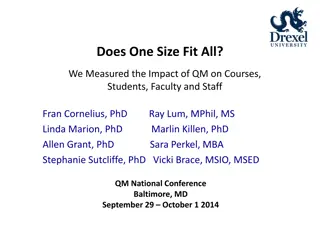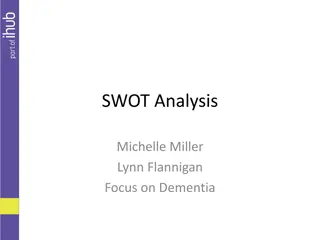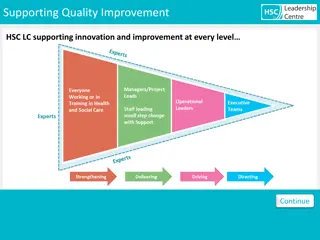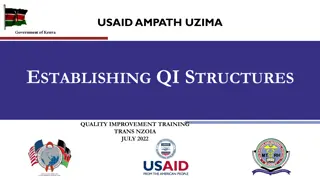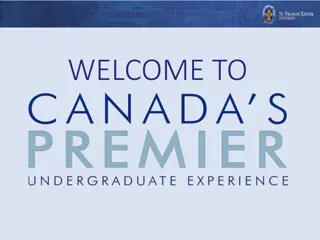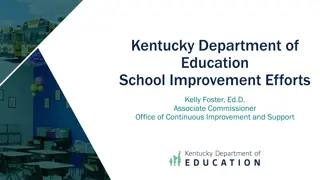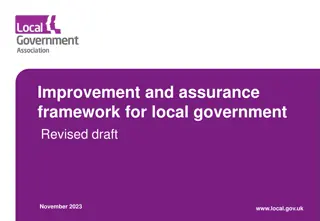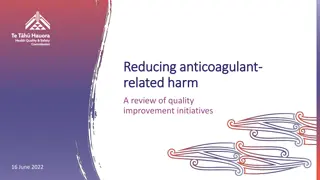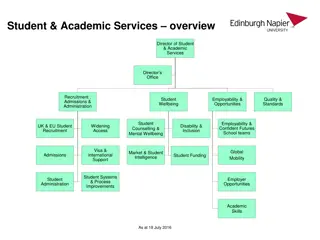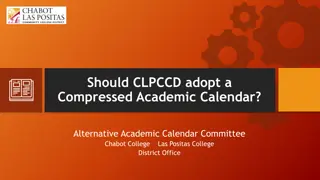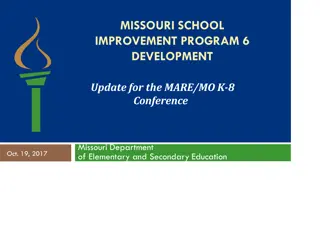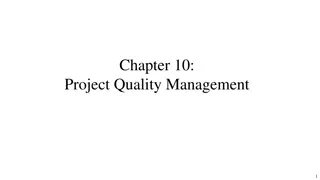Office of Academic Quality Improvement Presentation Overview
This presentation discusses focus points for academic quality improvement, student learning outcome reporting, submission of program learning outcomes assessment reports, and divisional report submissions for the academic year 2017. It covers areas such as assessment, program review, eLumen, criteria of accreditation, and collaboration efforts with AQI for various programs. The content highlights the processes and initiatives undertaken to enhance academic quality and improve learning outcomes.
Download Presentation

Please find below an Image/Link to download the presentation.
The content on the website is provided AS IS for your information and personal use only. It may not be sold, licensed, or shared on other websites without obtaining consent from the author.If you encounter any issues during the download, it is possible that the publisher has removed the file from their server.
You are allowed to download the files provided on this website for personal or commercial use, subject to the condition that they are used lawfully. All files are the property of their respective owners.
The content on the website is provided AS IS for your information and personal use only. It may not be sold, licensed, or shared on other websites without obtaining consent from the author.
E N D
Presentation Transcript
Office of Academic Quality Improvement Presentation January 22, 2018 Presentation by: Bruce Moses Jen Deschenes Wendy Weeks Special thank you to: Stephany Haack Vanessa Romero www.pima.ed u
Focus Points for Study Session 1. Assessment 2.Program Review 3.eLumen 4.Criteria of Accreditation www.pima.ed u
Student Learning Outcome Reporting The Office of Academic Quality Improvement facilitates Student Learning Outcomes on at minimum an annual cycle for Program Learning Outcomes (PLO) and semester cycle for Course Learning Outcomes (CLO) Faculty self identify areas in need of improvement Assessment Reports identify: PLOs or CLOs Common assessments used Target benchmarks for success Actual performance results Documentation of assessment process via the PIMA model Identification of new or continuing goals for next cycle www.pima.ed u
Submission of Program Learning Outcomes (PLO) Assessment Reports During the past academic year, more focus has been made on quality reporting and working with programs in need of assistance. 19% 80% combined AY- 2017 Out of 142 Progr ams 61% 20% Collabora ting with AQI Received 71% AY- 2016 29% 0% 20% 40% 60% 80% Percentage www.pima.ed u
AY 2017 Division PLO Report Submission: Received: Accounting Administration of Justice American Indian Studies Anthropology Applied Arts Archaeology Arts and Fine Arts Automotive Technology Aviation Technology Building and Construction Tech. Business Clinical Research Coordinator Computer Aided Design Computer Information Systems Dental Hygiene Dental Laboratory Technology Digital Arts Early Childhood Education Engineering Fashion Design Fire Science Fitness and Sports Sciences Health Information Technology History Hotel and Restaurant Management Human Resources Logistics and Supply Chain Management Medical Assistant Medical Laboratory Technician Nursing Paramedics Pharmacy Technology Phlebotomy Political Science Psychology Radiologic Technology Respiratory Care Social Services Sociology Teacher Education Therapeutic Massage Translation and Interpretation Truck Driving Training Welding Not Received: Business and Industry Technology County Corrections Culinary Arts Dental Assisting GMAW/FCAW Welding Electrical Utility Technology Law Enforcement Paralegal Veterinary Sciences Collaborating with AQI: Avionics Business Technology - CTD Culinary - CTD Liberal Arts Machine Tool Technology Medical Office Programs - CTD Science Surgical Technology - CTD www.pima.ed u
Submission of Course Learning Outcomes (CLO) Data and Assessment Reports Entry of CLO data into SLO Interface by divisions is consistent. 96% Spring/Su mmer 2017 Out of 105 Divisions 51% 45% 86% Return of Spring/Summer 2017 data submission was delayed until faculty returned in Fall. Fall 2016 Out of 122 Divisions 62% SLO Interface Data Entered 24% Assessment Report Received Assessment Report Not Received 92% 83% Spring/Su mmer 2016 Out of 118 Divisions 9% Recent drop in Assessment Report submissions maybe due to confusion of duties with re-organization. 88% Fall 2015 Out of 129 Divisions 74% 15% 0% 20% 40% 60% 80% 100% www.pima.ed u
How the Office of Academic Quality Improvement is Closing the Gap Current Strategies Working one on one with faculty and programs to provide training and assistance with measurable outcomes, assessment tools, appropriate target benchmarking and reporting Presentations at CDACs, Faculty Learning Academy, and All Deans Meetings Providing individual support to Deans Integrating PLO assessment into Program Review Greater collaboration with Curriculum Office Future Strategies Utilization of new assessment management system, eLumen Providing assistance with Guided Pathways curriculum changes to ensure PLO, CLO, and General Education Learning Outcomes (GELO) are appropriately mapped Representation on multiple Guided Pathways Initiative Strands www.pima.ed u
HLC Assessment Academy Project: General Education Learning Outcomes (GELO) Pilot Fall 2016 Attended HLC Assessment Academy and round table Developed GELO Assessment project in collaboration with our scholar and mentor Spring 2017 First round of GELO assessment 9 faculty participants volunteered from Student Learning Assessment Workgroup: Accounting, Art, Chemistry, Clinical Research, Communication, Computer Information Systems, Geography, Writing Data gathered on 190 students related to Communication, Critical & Creative Thinking, Quantitative & Scientific Literacy, and Information Literacy GELOs www.pima.ed u
HLC Assessment Academy Project: General Education Learning Outcomes (GELO) Pilot Spring 2017 Results Students assessed using standardize 1-4 rubrics. All GELOs have indicators that make up total GELO score. Students scoring 3 meet or exceed expectations Limitations of data from pilot include not a large enough course pool and not all indicators covered. % of Students Meeting or Exceeding Expectations Number of Observations Score (Mean) Aggregated GELOs TotalStudents Female Students Male Students 190 96 85 138 52 2.92 2.89 3.03 2.88 3.21 65% 62% 66% 61% 75% Students < 30 Years of Age Students 30 Years of Age Students within 1styear at 39 2.94 59% Pima Individual GELOs Communication 30 80 3.01 2.65 66% 62% Critical & Creative Thinking Quantitative & Scientific Literacy & Analysis Information Literacy Diversity and Global 71 2.67 55% 41 3.21 80% No data available Perspectives www.pima.ed u
HLC Assessment Academy Project: General Education Learning Outcomes (GELO) Pilot Fall 2017 Implementation of lessons learned from Spring 2017. 21 faculty participants from the following disciplines: Accounting, Art, Business, Chemistry, Clinical Research, Geography, Nursing, Writing Fall 2017 dataset includes data for all five GELOs, increase in student population, and broad range of 100 and 200 level courses Full data analysis pending and will attempt to combine Spring 2017 and Fall 2017 to provide trend analysis Future review of GELO indicators to be determined by General Education Committee. www.pima.ed u
Previous State of Program Review Feedback from faculty and administrators on previous program review cycles included: Forms too long and cumbersome Data on enrollment, completion, persistence, and retention was difficult to interrupt No feedback or follow-up after completion Limited perceived value in completing process www.pima.ed u
Modifications Made to Program Review Program review cycle has been updated to provide more collaboration and feedback with academic stakeholders New streamlined forms have been developed 6 Metric Indicators implemented: Enrollment, Completion, Persistence, Retention, Fiscal Viability, and Employment Introduction of Peer Faculty Review New cycle started Fall 2017 and will end Fall 2018 All programs were reviewed through Program Priority in Fall 2017 www.pima.ed u
Program Review Timeline Year Leading into Review Year of Review Fall Semester Year of Review Spring Semester Post Review Final metric data provided early Fall Programs and Deans with approved or modified improvement plans notified Deans and Programs Notified by All College Day Programs and Deans to work towards goals stated in improvement plan Self-Study Packet submitted to AQI Distribution of Self- Study Packets and preliminary metric data early Fall Programs determined for inactivation notified and inactivation/teach out process started Yearly summary metrics provided Faculty Peer Review Committee review and provide recommendations 2 years post review, programs to provide update on progress, pain points, and needs Meet with AQI in Fall and Spring for assistance Posting of Program Review results to intranet Dean review and recommendations Identify and train faculty peer review committee in Spring Restart cycle 4 years post review Provost review and sign off in time for January Board Packet Deadline www.pima.ed u
Programs Currently in Review Process American Indian Studies Degree Anthropology Degree Applied Arts Degree Aviation Technology Degree and Certificates Avionic Technician Certificate Elementary Education Degree Field Archaeology Certificate Fine Arts Degree Health Information Technology Degree and Certificate Hotel Restaurant Management Degree and Certificate Medical Office CTD Certificates Respiratory Therapy Degree Sciences Degree Special Education Mild-Moderate Disabilities Certification Certificate Teacher Post Degree Certification Certificate www.pima.ed u
Programs Scheduled to Start Review Process Fall 2018 Automotive Fitness Professional Degree and Certificate Certificate Clinical Research Coordinator Degree Computer Information Systems Degree and Certificates Digital Arts Degrees and Certificates Early Childhood Education Degrees and Certificates Engineering Degree Interpreter Training Degree Liberal Arts Degree Medical Laboratory Technician Degree Social Services Degree and Certificate Surgical Technology - CTD Certificate Other programs to be determined based on need and results of Program Priority www.pima.ed u
Future of Assessment: eLumen eLumen was purchased September 2017 to assist the college in the collection, aggregation, and reporting of Student Learning Assessment and Program Review Implementation of system started October 2017 College rollout broken into phases; Phase 1 Pilot Group Spring 2018 All future new programs or courses will automatically be enrolled into eLumen www.pima.ed u
What eLumen will do for Pima? Provides a centralized, electronic system for assessment and program review Faculty can directly assess students within the system Provides a tool for student success measurements based on student learning outcome achievement Provides an easier way to align outcomes across all assessment levels and interconnect with goals and objectives Provides reports on success and outcomes for course, program, or division Can provide connections between assessment outcomes and budget requests Assessment information more readily available across the institution Easier mechanism for program review workflow More organization, and less time tracking down information Provides a structure of assessment to provide evidence for Higher Learning Commission criterion 4 www.pima.ed u
eLumen Phased Timeline Phase 2: Fall Expansion Phase 3: College Wide Usage Phase 1: Implementation Phase 1: Pilot Group Develop plan for lessons learned from pilot 6 programs for initial use and testing. Includes Academic, CTD, and Full Year programs. Increase program and course usage each semester Set up eLumen infrastructure Set up D2L integration Enhance communication and training plan Set up training from division champions for new faculty Test settings and capabilities Train division coordinators from pilot group (February, 2018) 14 volunteer programs and courses Goal of 75% or more of faculty utilizing system by Spring 2020 Train key users Develop communication plan Train pilot group faculty Real time data entry for CLO and PLO assessment Fall 2018 Develop standard training Real time data entry for CLO and PLO assessment in Spring 2018 www.pima.ed u
eLumen Programs and Courses Spring 2018 Pilot Programs (Phase 1): Accounting Clinical Research Coordinator Fashion Design Post Bachelor Education Surgical Technology Truck Driving Fall 2018 Expansion Volunteers (Phase 2) Building and Construction Technology Business Computer Information Systems CTD Medical Office Programs Economics Education Fire & Emergency Services Higher Education Human Resources Medical Assistant Nursing Paramedic Pharmacy Technology Phlebotomy Writing 101 www.pima.ed u
eLumen: Supporting College Initiatives Planned sunset of SLO Interface Expansion of use of D2L course shells for all courses, regardless of modality College wide use of D2L Gradebook Inclusion of assessment data for budgetary purposes Expand eLumen usage beyond assessment www.pima.ed u
Finance and Administration With Gratitude to those who have dedicated their time and expertise Michael Amick Alan Baltazar Kathy Broneck Jason Brown Jaime Calvao Carlos Carrillo Virginia Chomiak Shane Clark Geselle Coe Gary Cooper Angelina Corrales Scott Cowell Joe Dal Pra Mark DeBenedetti Maricella Diaz Maya Eagleton David Fonseca Wilbert Harri Sharon Hollingsworth Kathy Karlberg Jan Kempster Amery Klappert Vivian Knight Rita Lennon Charlie MacCabe Kat Manton-Jones Kathleen Marks Raj Murthy Ralph Palumbo David Purkiss Renee Richards Kenneth Scott Tatyana Thweatt Ivy Walker Marcia Wojsko www.pima.ed u u www.pima.ed
